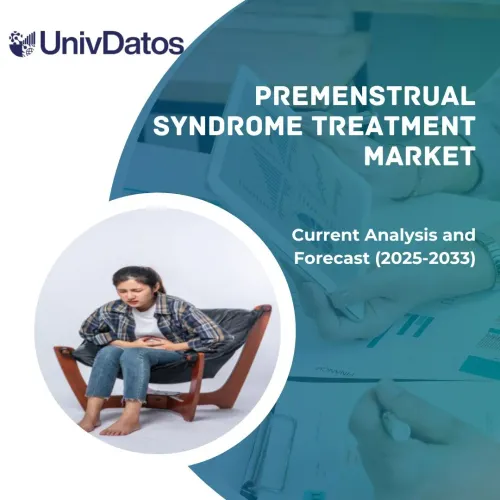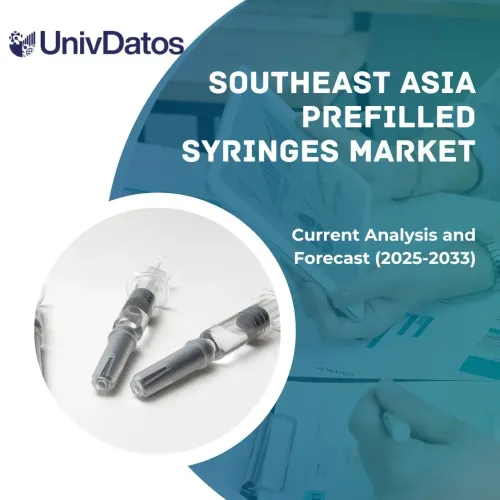- Home
- About Us
- Industry
- Services
- Reading
- Contact Us
CXCR4 Antagonist Market: Current Analysis and Forecast (2024-2032)
Emphasis on Type (Plerixafor, Others), Application (Cancer, HIV, Chronic Inflammatory Disease, and Others), Distribution Channel (Hospital Pharmacies, Retail Pharmacies, and Online); and Region/Country
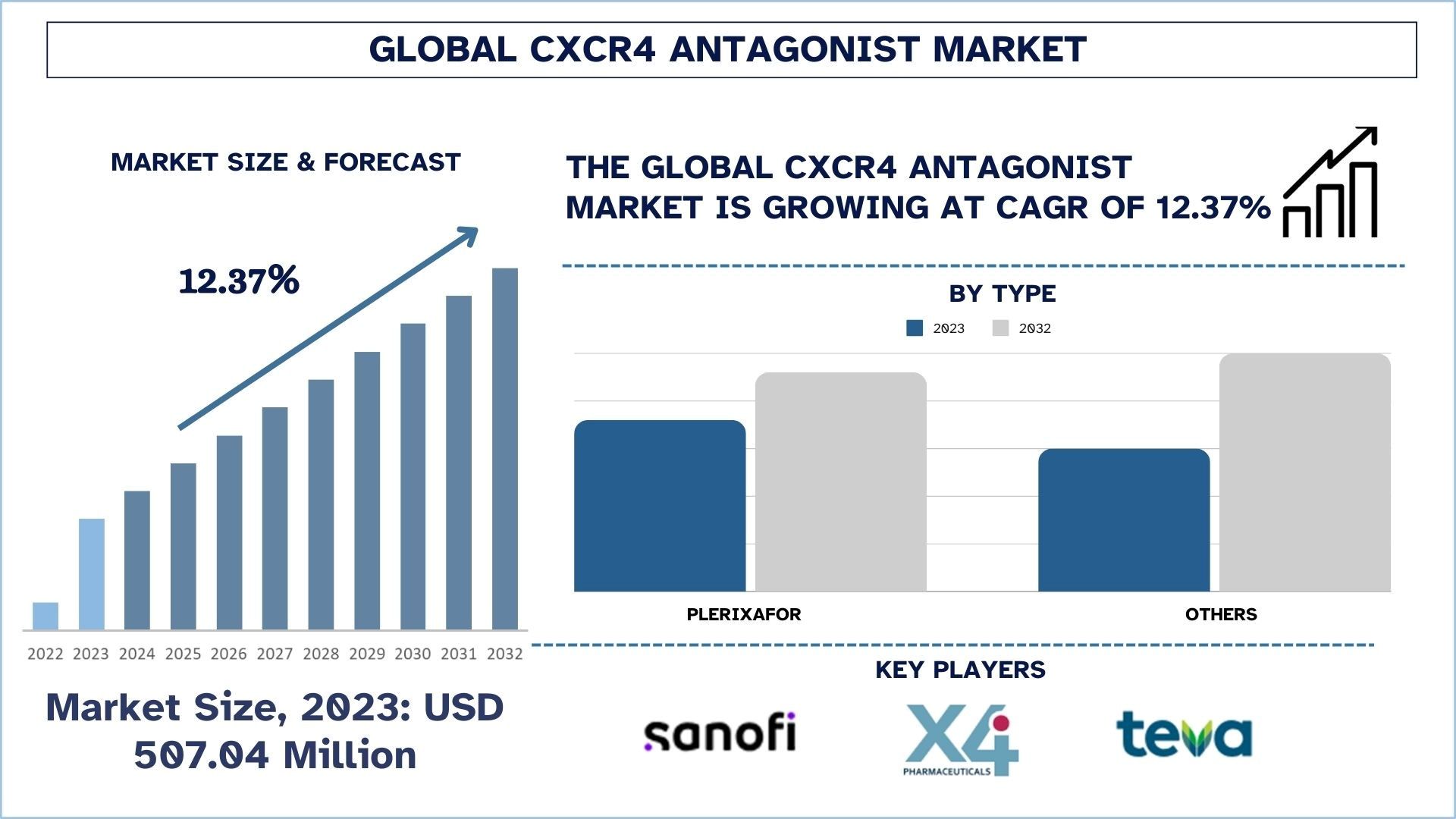
CXCR4 Antagonist Market Size & Forecast
The CXCR4 Antagonist market was valued at approximately USD 507.04 million in 2023 and is expected to grow at a substantial CAGR of around 12.37% during the forecast period (2024-2032) owing to the increasing incidence of cancer worldwide, technological advancements, and increasing government support and funding .
CXCR4 Antagonist Market Analysis
A CXCR4 antagonist is a drug that binds to the CXCR4 receptor, a G-protein coupled receptor that is utilized in numerous physiological functions such as immune function and cell movement. Antagonists of the receptor CXCR4 block ligand binding and downstream signaling of CXCL12, which plays a role in various cellular processes including cancer metastasis and HIV entry. Such antagonists are most relevant in cancer treatment since they prevent the migration of cancerous cells and thus limit the spread of the tumor. However, its application in HIV treatment has also shown great potential.
The rising HIV infections across the world is expected to drive the CXCR4 antagonist market in the foreseen future. HIV evolved to be one of the most threatening diseases in the world, despite the advancements in the particular treatment through ART. The Joint United Nations Program on HIV/AIDS (UNAIDS) has estimated that 38 million people were living with HIV in 2021 worldwide and new infections are still occurring. This estimation shows that there is a critical need for new therapeutic approaches to treat HIV satisfactorily. CXCR4 antagonists are crucial in HIV treatment since they prevent the binding of HIV to its co-receptor, CXCR4. Some species of HIV that infect a host target this receptor to penetrate host cells such as CD4+ T cells. As blocking agents of CXCR4, these antagonists effectively avoid viral enterprises and duplications; this strategy is conceived to be a divergent method from the standard ARV approach of attacking viral enzymes and proteins.
CXCR4 Antagonist Market Trends
This section discusses the key market trends influencing the various segments of the CXCR4 antagonist market as identified by our research experts.
Collaborations and Partnerships
Frequent and continuous collaborations and partnerships are among the most essential trends for the growth of CXCR4 antagonist market. Partnership agreements between pharmaceutical companies and research organizations gain expertise from each other and allow access to the latest technologies that help in the development of advanced and innovative therapeutic drugs. Mergers and acquisitions allow the key players to gain access to a new geography and ensure market expansion as well as enhance their global reach. For instance, in November 2021, Abbisko Therapeutics Co. Ltd., which is a China-based pharmaceutical company, Joined hands with X4 Pharmaceuticals, Inc. for the development of CXCR4 antagonists.
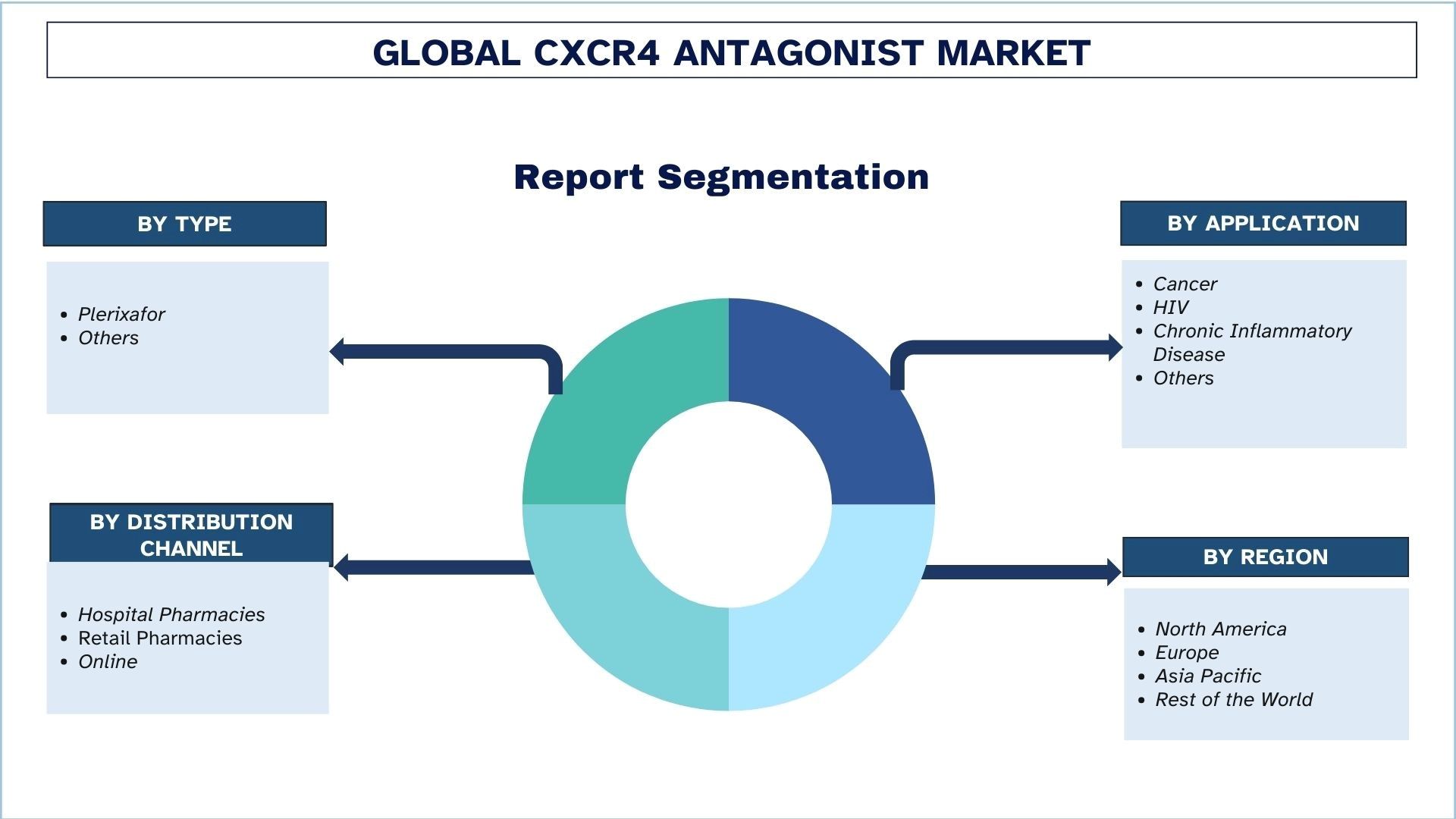
North America has a significant share of the market in 2023.
North America has huge importance as the largest CXCR4 Antagonist market globally due to the increase in demand for CXCR4 antagonists with the rising cases of cancer and HIV. For instance, the American Cancer Society estimates that, in 2023, 1,958,310 new cancer cases and 609,820 cancer deaths are projected to occur in the United States. To tackle this growing number of cancer cases, the development of effective therapeutics such as CXCR4 antagonists is essential. Modernizing drug development technologies such as the application of artificial intelligence in research, and the tendencies towards patient-oriented legislation affecting the healthcare market also influence the market’s growth in North America. Additionally, the presence of leading players such as X4 Pharmaceuticals Inc. and GlycoMimetics is further leading to its significant market.
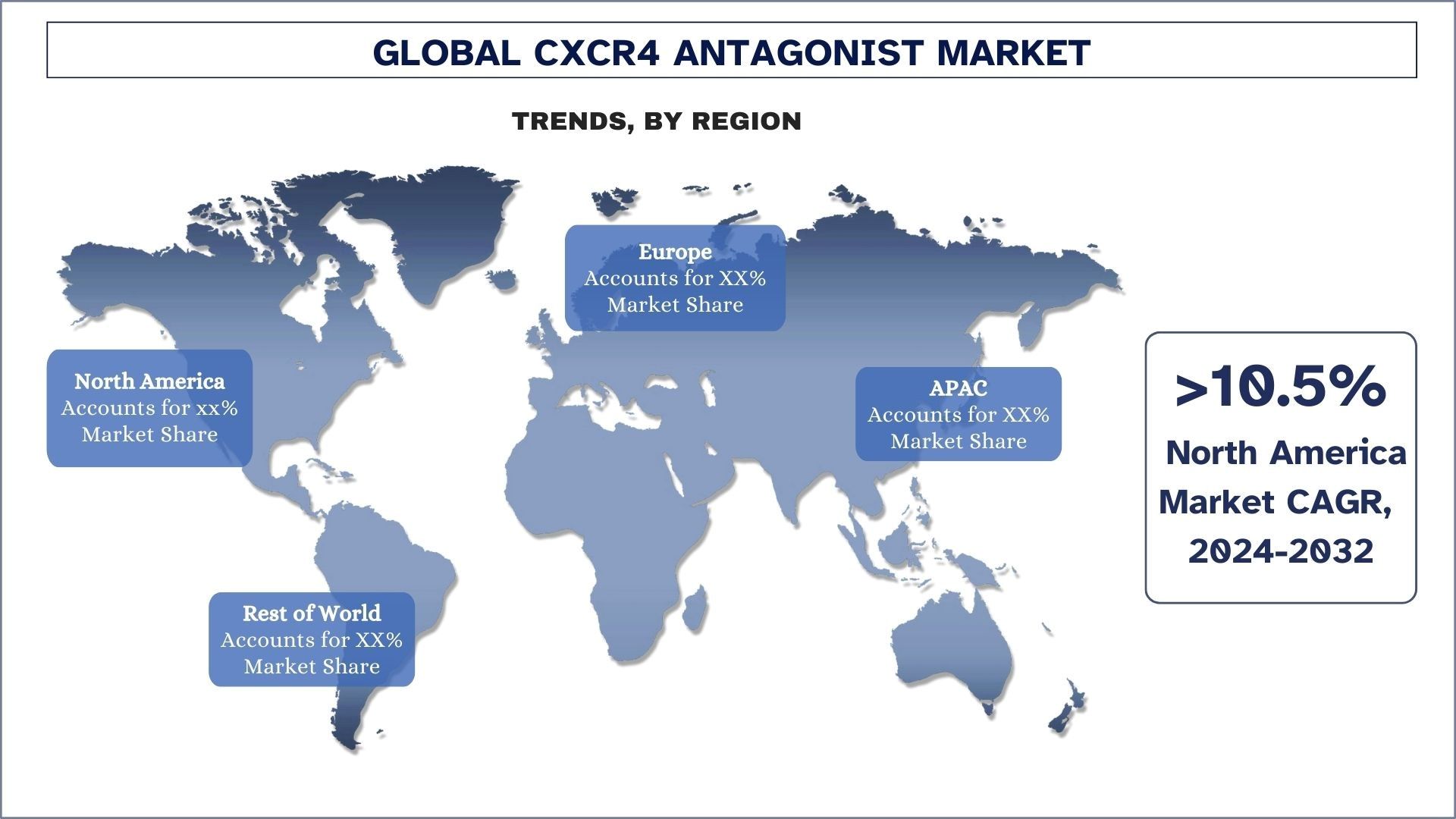
CXCR4 Antagonist Industry Overview
The CXCR4 antagonist market is competitive, with several global and international players. The key players are adopting different growth strategies to enhance their market presence, such as partnerships, agreements, collaborations, new product launches, geographical expansions, and mergers and acquisitions. Some of the major players operating in the market are Sanofi, Teva Pharmaceutical Industries Ltd., X4 Pharmaceuticals, Inc., BioLineRx Ltd., Merck KGaA, GPCR Therapeutics, AdAlta Limited, Spexis Ltd., GlycoMimetics, Abbisko Therapeutics Co. Ltd.
CXCR4 Antagonist Market News
In October 2024 - GPCR Therapeutics Inc. announced that it has received an Orphan Drug Designation (Burixafor) from the U.S. Food and Drug Administration (FDA) for its hematopoietic stem cell mobilization agent. This is currently in Phase 2 clinical trials in the United States.
In August, 2024 - Pentixapharm Holding AG is undergoing a clinical trial for testing Pentixafor (CXCR4 antagonist) in an EMA-endorsed Phase III pivotal study for the staging of Marginal Zone Lymphoma (MZL), which is a subtype of Non-Hodgkin B Cell Lymphoma.
In May, 2024, Gland Pharma, an Indian pharmaceutical company, announced that it has achieved a significant milestone with the approval of Plerixafor Injection by the United States Food and Drug Administration (USFDA).
CXCR4 Antagonist Market Report Coverage
Report Attribute | Details |
Base year | 2023 |
Forecast period | 2024-2032 |
Growth momentum | Accelerate at a CAGR of 12.37% |
Market size 2023 | USD 507.04 million |
Regional analysis | North America, Europe, Asia-Pacific, Rest of the World |
Major contributing region | Asia-Pacific is expected to grow at the highest CAGR during the forecasted period. |
Key countries covered | U.S., Canada, Germany, France, UK, Spain, Italy, China, Japan, and India |
Companies Profiled | Sanofi, Teva Pharmaceutical Industries Ltd., X4 Pharmaceuticals, Inc., BioLineRx Ltd., Merck KGaA, GPCR Therapeutics, AdAlta Limited, Spexis Ltd., GlycoMimetics, Abbisko Therapeutics Co. Ltd. |
Report Scope | Market Trends, Drivers, and Restraints; Revenue Estimation and Forecast; Segmentation Analysis; Demand and Supply Side Analysis; Competitive Landscape; Company Profiling |
Segments Covered | By Type, By Application, By Distribution Channel, By Region/Country |
Reasons to buy this report:
The study includes market sizing and forecasting analysis validated by authenticated key industry experts.
The report presents a quick review of overall industry performance at one glance.
The report covers an in-depth analysis of prominent industry peers with a primary focus on key business financials, product portfolios, expansion strategies, and recent developments.
Detailed examination of drivers, restraints, key trends, and opportunities prevailing in the industry.
The study comprehensively covers the market across different segments.
Deep dive regional level analysis of the industry.
Customization Options:
The global CXCR4 Antagonist market can be customized further as per the requirement or any other market segment. Besides this, UMI understands that you may have your own business needs, hence feel free to connect with us to get a report that completely suits your requirements.
Table of Content
Research Methodology for the CXCR4 Antagonist Market Analysis (2022-2032)
Analyzing the historical market, estimating the current market, and forecasting the future market of the global CXCR4 antagonist market were the three major steps undertaken to create and analyze the penetration of CXCR4 antagonist in major regions globally. Exhaustive secondary research was conducted to collect the historical market numbers and estimate the current market size. Secondly, to validate these insights, numerous findings and assumptions were taken into consideration. Moreover, exhaustive primary interviews were also conducted with industry experts across the value chain of the global CXCR4 antagonist market. Post assumption and validation of market numbers through primary interviews, we employed a top-down/bottom-up approach to forecasting the complete market size. Thereafter, market breakdown and data triangulation methods were adopted to estimate and analyze the market size of segments and sub-segments of the industry. Detailed methodology is explained below:
Analysis of Historical Market Size
Step 1: In-Depth Study of Secondary Sources:
A detailed secondary study was conducted to obtain the historical market size of the CXCR4 antagonist market through company internal sources such as annual reports & financial statements, performance presentations, press releases, etc., and external sources including journals, news & articles, government publications, competitor publications, sector reports, third-party database, and other credible publications.
Step 2: Market Segmentation:
After obtaining the historical market size of the CXCR4 Antagonist market, we conducted a detailed secondary analysis to gather historical market insights and share for different segments & sub-segments for major regions. Major segments are included in the report as type, application, distribution channel, and regions. Further country-level analyses were conducted to evaluate the overall adoption of CXCR4 antagonist in that region.
Step 3: Factor Analysis:
After acquiring the historical market size of different segments and sub-segments, we conducted a detailed factor analysis to estimate the current market size of the CXCR4 Antagonist market. Further, we conducted factor analysis using dependent and independent variables such as type, application, distribution channel, and regions of the CXCR4 Antagonist market. A thorough analysis was conducted for demand and supply-side scenarios considering top partnerships, mergers and acquisitions, business expansion, and product launches in the CXCR4 antagonist market across the globe.
Current Market Size Estimate & Forecast
Current Market Sizing: Based on actionable insights from the above 3 steps, we arrived at the current market size, key players in the global CXCR4 antagonist market, and market shares of the segments. All the required percentage shares split and market breakdowns were determined using the above-mentioned secondary approach and were verified through primary interviews.
Estimation & Forecasting: For market estimation and forecast, weights were assigned to different factors including drivers & trends, restraints, and opportunities available for the stakeholders. After analyzing these factors, relevant forecasting techniques i.e., the top-down/bottom-up approach were applied to arrive at the market forecast for 2032 for different segments and sub-segments across the major markets globally. The research methodology adopted to estimate the market size encompasses:
The industry’s market size, in terms of revenue (USD) and the adoption rate of the CXCR4 antagonist market across the major markets domestically.
All percentage shares, splits, and breakdowns of market segments and sub-segments.
Key players in the global CXCR4 antagonist market in terms of products offered. Also, the growth strategies adopted by these players to compete in the fast-growing market.
Market Size and Share Validation
Primary Research: In-depth interviews were conducted with the Key Opinion Leaders (KOLs) including Top Level Executives (CXO/VPs, Sales Head, Marketing Head, Operational Head, Regional Head, Country Head, etc.) across major regions. Primary research findings were then summarized, and statistical analysis was performed to prove the stated hypothesis. Inputs from primary research were consolidated with secondary findings, hence turning information into actionable insights.
Split of Primary Participants in Different Regions
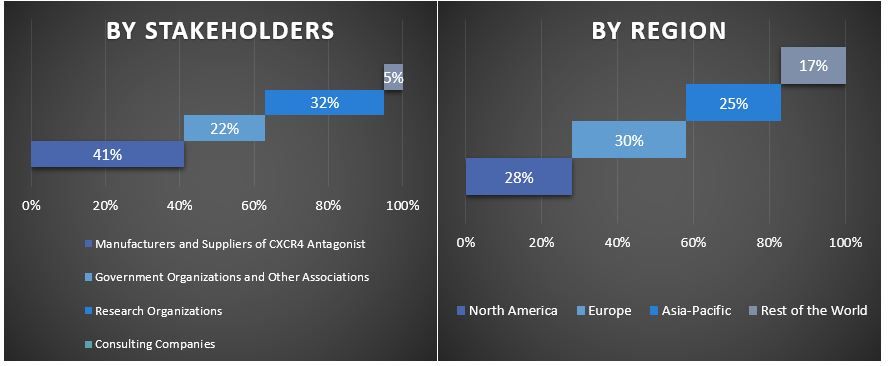
Market Engineering
The data triangulation technique was employed to complete the overall market estimation and to arrive at precise statistical numbers for each segment and sub-segment of the global CXCR4 antagonist market. Data was split into several segments and sub-segments after studying various parameters and trends in the type, application, distribution channel, and regions of the global CXCR4 antagonist market.
The main objective of the Global CXCR4 Antagonist Market Study
The current & future market trends of the global CXCR4 antagonist market were pinpointed in the study. Investors can gain strategic insights to base their discretion for investments on the qualitative and quantitative analysis performed in the study. Current and future market trends determined the overall attractiveness of the market at a regional level, providing a platform for the industrial participant to exploit the untapped market to benefit from a first-mover advantage. Other quantitative goals of the studies include:
Analyze the current and forecast market size of the CXCR4 antagonist market in terms of value (USD). Also, analyze the current and forecast market size of different segments and sub-segments.
Segments in the study include areas of type, application, distribution channel, and regions.
Define and analyze the regulatory framework for the CXCR4 antagonist
Analyze the value chain involved with the presence of various intermediaries, along with analyzing customer and competitor behaviors of the industry.
Analyze the current and forecast market size of the CXCR4 antagonist market for the major region.
Major countries of regions studied in the report include Asia Pacific, Europe, North America, and the Rest of the World
Company profiles of the CXCR4 antagonist market and the growth strategies adopted by the market players to sustain the fast-growing market.
Deep dive regional level analysis of the industry.
Frequently Asked Questions FAQs
Q1: What is the CXCR4 Antagonist market's current size and growth potential?
The CXCR4 Antagonist market was valued at USD 507.04 million in 2023 and is expected to grow at a CAGR of 12.37% during the forecast period (2024-2032).
Q2: What are the driving factors for the growth of the CXCR4 Antagonist market?
The Increasing incidences of cancer and HIV, Innovations in drug delivery technologies, development of combination therapies, supportive regulatory frameworks, and increased research and development drive the CXCR4 antagonist market.
Q3: Which segment has the largest share of the CXCR4 Antagonist market by Type?
The plerixafor segment has the largest share of the CXCR4 antagonist market by type.
Q4: What are the major trends in the CXCR4 Antagonist market?
Integration of Artificial Intelligence (AI) in Drug Discovery and Advancements in Drug Delivery Systems are the major trends in the CXCR4 Antagonist market.
Q5: Which region will dominate the CXCR4 Antagonist market?
North America dominated the market in 2023.
Related Reports
Customers who bought this item also bought


